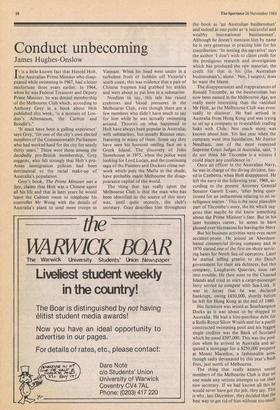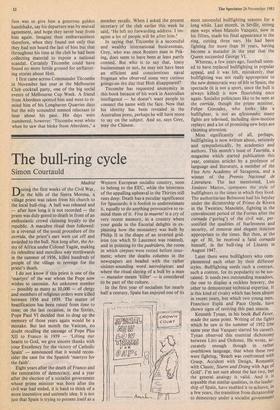Conduct unbecoming
James Hughes-Onslow
t is a little known fact that Harold Holt,
It
Australian Prime Minister who disap- peared while swimming in 1967, had a lesser misfortune three years earlier. In 1964, when he was Federal Treasurer and Deputy Prime Minister, he was denied membership of the Melbourne Club which, according to Anthony Grey in a book about Holt published this week, 'is a mixture of Lon- don's Athenaeum, the Carlton and Boodle's.'
'It must have been a galling experience' says Grey, 'for one of the city's own elected members of the Commonwealth Parliament who had worked hard for the city for nearly thirty years.' There were those among the decidedly pro-British membership, Grey suggests, who felt strongly that Holt's pro- Asian immigration policies had been detrimental to the racial make-up of Australia's population.
Grey's book, The Prime Minister was a Spy, claims that Holt was a Chinese agent all his life and that in later years he would leave the Cabinet room to telephone his controller Mr Wong with the details of Australia's plans to send more troops to
Vietnam. When his head went under in a turbulent froth of bubbles off Victoria's south coast, this was evidence that a pair of Chinese frogmen had grabbed his ankles and were about to put him in a submarine.
Needless to say, this tale has raised eyebrows and blood pressures in the Melbourne Club, even though there are a few members who didn't have much to say for him while he was actually swimming around. Theories on what happened to Holt have always been popular in Australia; with submarines, but usually Russian ones, featuring in many of them. Some say they have seen his bronzed smiling face on a Greek Island. The discovery of John Stonehouse in 1975, when the police were looking for Lord Lucan, and the continuing saga of the Painters and Dockers crime net- work which puts the Mafia in the shade, have probably made Melbourne the disap- pearance capital of the world.
The thing that has really upset the Melbourne Club is that the man who has been identified as the source of this story was, until quite recently, the club's secretary. Gray describes him throughout the book as 'an Australian businessman' and indeed at one point as 'a successful and wealthy international businessman'. Although he doesn't mention him by name he is very generous in praising him for his contribution: 'In writing the narrative' says the author 'I don't wish to claim credit for the prodigious research and investigation which has produced the raw material; the credit for that is his [the Australian businessman's] alone.' Nor, I suspect, does he want the blame.
The disappearances and reappearances of Ronald Titcombe, as the businessman has now been named in the Melbourne Age, are really more interesting than the vanished Mr Holt, as the Melbourne Club was even- tually to discover. He had arrived in Australia from Hong Kong and was trying to set up a company to re-establish trading links with Chile. Not much more was known about him. Yet last year when the company went into liquidation, Mr Justice Needham, one of the most respected Supreme Court Judges in Australia, said, 'I do not think Mr Titcombe is a witness I could place any confidence in,'
Once an officer in the Australian Navy, he was in charge of the diving division, bas- ed in Canberra, when Holt disappeared, He left the navy in the following year, 1968, ac- cording to the present Attorney General Senator Gareth Evans, 'after being ques- tioned for an indiscretion relating to an in- telligence matter.' This is the most plausible part of Titcombe's story, the bit which sug- gests that maybe he did know something about the Prime Minister's fate. But in his later business career, he seems to have glossed over his reasons for leaving the Navy.
But his business activities were even more accident-prone. He joined an Aberdeen- based commercial diving company and in 1970 started one of the first on-shore servic- ing bases for North Sea oil operators. Later he started selling granite to the Dutch government for their sea defences, but this company, Longhaven Quarries, soon ran into trouble. He then went to the Channel islands and tried to start a cargo-passenger ferry service to compete with Sea-Link, It was in Jersey that he was declared bankrupt, owing £650,000, shortly before he left for Hong Kong at the end of 1980.
His furniture was seized at Southampton Docks as it was about to be shipped to Australia. He had a hire-purchase debt for a Rolls-Royce Silver Wraith and for a partly constructed swimming pool and his biggest single creditor was the Bank of Scotland which he owed £397,000. This was the posi- tion when he arrived in Australia and ac- quired a mortgage for a $250,000 property at Mount Macedon, a fashionable area, though sadly devastated by this year's bush fires, just north of Melbourne. The thing that really annoys senior members of the Melbourne Club is that no one made any serious attempts to vet their new secretary. If we had known all this he would never have got the job, they say. This is why, last December, they decided that the best way to get rid of him without too much fuss was to give him a generous golden handshake, say his departure was by mutual agreement, and hope they never hear from him again. Imagine their embarrassment therefore, when they found not only that they had not heard the last of him but that throughout his time at the club he had been collecting material to expose a national scandal. Certainly Titcombe could have found no more fertile ground for unflatter- ing stories about Holt.
I first came across Commander Titcombe in November last year at the Melbourne Club cocktail party, one of the big social events of Melbourne Cup Week. A friend from Aberdeen spotted him and went to re- mind him of his Longhaven Quarries days but the wily scoundrel seemed reluctant to hear about his past. His days were numbered, however: `Titcombe went white when he saw that bloke from Aberdeen,' a member recalls. When I asked the present secretary of the club earlier this week he said, 'He left no forwarding address. I im- agine a lot of people will be after In saying that Titcombe is a successful and wealthy international businessman, Grey, who was once Reuters man in Pek- ing, does seem to have been at least partly conned. But who is to say that, lousy businessman or not, he may not have been an efficient and conscientious naval frogman who observed some very curious goings-on the day that Holt disappeared?
Titcombe has requested anonymity in this book because of his work in Australian intelligence — he doesn't want people to connect the name with the face. Now that his identity has been revealed in the Australian press, perhaps he will have more to say on the subject. And so, .says Grey, may the Chinese.















































 Previous page
Previous page